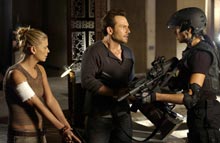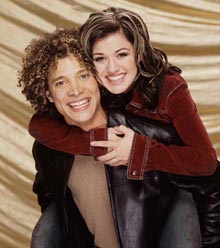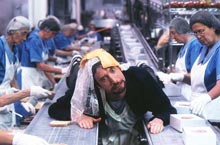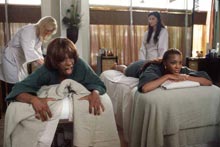I am taking one of my rare jaunts out of town — in this case, I’m off very early Friday morning to the Florida Film Festival to spend a couple of days with Ken and Lisi Russell, who are guests there this year, and to see screenwriter Barry Sandler (Crimes of Passion), who works with the festival and teaches screenwriting at the University of Central Florida.
The upshot of this trip is that it left me with very little time this week, which translated into not enough time to write a “Screening Room.” So instead of writing one, I had this notion of selecting some of my personal favorite bits of bitchiness from the review archives. This was supposed to save time. It didn’t really — not by the time I read over this or that review, picked the quote and reformatted it for the column, etc. Well, as an idea, it was fine. In execution, not so much.
I’ve said before — and it remains true — that it’s much more gratifying to write a good review. It’s more fulfilling to think that I’ve had some positive impact on a film I think worthy of attention. And there has been evidence that I’ve been successful in that regard on some occasions. Now, having said that, I admit that it’s often more fun to write a bad review, even if it’s not so much fun to sit through a bad movie. Moreover, let’s be honest — a good portion of my readership opens the paper and makes a dive for the one star — and lower — reviews. Even Fine Arts manager Neal Reed—a man who helps bring quality films to town — will admit to this. Indeed, he’s been known to ask me if he has such a review to look forward to on Wednesday. The movie industry being what it is he often gets the answer he desires.
With this in mind, what we have below is a collection of bits culled from eight-plus years of reviews of movies that were distinctly underwhelming. Think of these movies as an abundance of awfulness or a surfeit of suckage. (And bear in mind, I won’t be much available for the next few days to respond to any brickbats hurled in my direction over this.) Shall we go?
The Reviews
You may have seen worse movies than 10,000 B.C., but you’ll have to work hard to find a dumber one. Even for a Roland Emmerich picture, this sets new standards for stupidity. This is like Uwe Boll with a budget. This is the village idiot of movies. No sooner had the end credits started to roll than my colleague Justin Souther remarked, “It’s hard to believe that was written by adults” — at which point, small children everywhere doubtless took umbrage over his implicit defamation of their intellect and are even now marching toward his house with torches ablaze.
The idea appears to have been to add some depth to the proceedings, which is a bizarre idea anyway. After all, this is the cinematic equivalent of a funhouse ride, not Ibsen with entrails. (13 Ghosts)

At another point in the laborious proceedings, ever-so-cool detective Wade Handler (the colorless Benjamin Bratt) tells the terrified Catherine that she can “hang out” with him in his apartment, and promptly starts reading a Graham Greene novel. As if to retaliate, Catherine snatches up a handy copy of Camus’ The Stranger and settles in for a read. These folks may not have a clue about being sociable, but damn they’re sophisticated! (Abandon)
I’ll concede that I only nodded off once (during a bout of tepid faux intercourse between Christian Slater and Tara Reid), whereas I was briefly gathered into the arms of Morpheus three times during Mr. Boll’s last film, The House of the Dead. On the surface, that might suggest that this film is marginally superior, but the truth is that Alone in the Dark is merely noisier than its predecessor. All things being equal, I preferred the comparative restfulness of House of the Dead.

Unfortunately, the problems start almost as soon as the “possession” takes hold and young Betsy Bell (Rachel Hurd-Wood) gets hoisted by her flowing tresses and bitch-slapped by the demon (memo to demons: keep your pimp-hand strong). Things hardly improve when the film resorts to repetitious flare-ups of candles and fireplaces, and reach maximum amusement when a Bible rips itself apart page by page in a scene that looks like an exploding Xerox machine. (An American Haunting)
There comes a time in the affairs of film critics when critical acumen completely breaks down, when one reaches one’s cinematic Waterloo, when all the carefully turned phrases that might otherwise occur flee the room and one is forced to merely say, “God, this movie is just plain dumb.” (The Animal)
Bangkok Dangerous’ biggest sin is that it’s just damned dull. Even the sight of Nicolas Cage sporting some sort of matted animal pelt as hair offers insufficient amusement to liven up this moribund mélange.
The various bombardments of CGI maggots just don’t cut it (now, there’s a complaint I’ve never had about a movie before!). (Bones)
It confirms one of my greatest fears: that Morgan Freeman is fully capable of narrating movies from beyond the grave. (The Bucket List)

How bad is it? Well, for a brief moment, I wished I was watching From Justin to Kelly again. (Cheaper by the Dozen)
Within 10 of its 88 minutes, you know that this is no mere bad movie. It’s so bad that it’s hard to believe it got this bad accidentally. Presumably it did, though the fact that its per screen box-office average is $666, according to Box Office Mojo, may suggest something darker. (The Country Bears)
As actors … well, they’d make great underwear models—which the film establishes with more beefcake than you’ll find this side of a Victor Salva picture. The best performance comes from someone named Chritian Baril in the role of “Dead Teenage Boy.” (How’d you like that on your resume?) (The Covenant)
In Kevin Smith’s Jay and Silent Bob Strike Back, there’s an amusing aside where Wes Craven directs Shannen Doherty in a cheesy horror movie. When the script calls for her to be attacked by an orangutan dressed in a Scream costume, she upbraids the director: “Jesus, Wes, you guys aren’t even trying anymore!” Who would have thought that this bit of satire was prophetic? (Cursed)
Darkness Falls is the name of a small town in Maine where the action takes place. (The action actually takes place in Australia, but the filmmakers insist we’re in Maine—and they can prove it. They have enough 20-plus-year-old American cars to park along a very short side street. So there.) (Darkness Falls)
There’s a rumor I’ve heard whispered that at some point in its creation, Deck the Halls contained at least one original idea. However, the producers were so outraged by this affront to their commercial sensibilities that the idea was surgically excised and the perpetrator summarily executed. That’s probably not true, if only because any original idea in this witless drivel-fest would have died of loneliness in short order.
I’m reliably informed that there are indeed people who find Larry the Cable Guy amusing. However, I have yet to meet these folks, who seem to me as elusive as the people making up the audience for Abie’s Irish Rose did to theater critic and humorist Robert Benchley in the 1920s. And like Benchley, I’m ready to believe—in the event that some H.L. Mencken-like jiggery-pokery propels Delta Farce into the realm of success—that the existence of such an audience would prove why democracy will never work.
Before dredging our way through the cesspool of comedy that is the new Deuce Bigalow, I do want to note that it continues a very welcome trend in bad movies. Two weeks ago, Stealth arrived on the scene at 121 excruciating minutes. Last week The Dukes of Hazzard yee-hawed into town—and while it wasn’t appreciably better than Stealth, it was 16 minutes shorter. This expression of humanity prompted me to give Dukes an extra half-star. Now we have Deuce Bigalow clocking in at 83 minutes—that’s 22 minutes shy of Dukes, which represents a net savings of six minutes more than Dukes had already saved over Stealth. This veritably magnanimous gesture garnered Deuce another half-star. If this trend keeps up, the next such atrocity should be at least 28-30 minutes shorter than Deuce Bigalow. (Deuce Bigalow: European Gigolo)
The only bright side is that almost no one seems to be watching the movie—at least judging by the 7:40 p.m. showing I attended on Friday night. There were maybe a dozen people in attendance. A covey of young ladies spent the entire film text messaging on their cell phones and talking amongst themselves. A couple near them finally wandered off to seats on the other side of the theater and proceeded to occupy themselves with seemingly more intimate matters. Someone else left part way through. A more stalwart bunch sat quietly in the front rows. They may have been conscious. And there I was in the very last row—as far from the screen as possible to avoid contagion—grim in the realization that I was perhaps the only person actually watching Disaster Movie.
Down to Earth is a remake, but—and this must be clearly understood—it is not a remake of the 1947 film, Down to Earth. Rather, it is a remake of the 1978 Warren Beatty film, Heaven Can Wait, which is not a remake of the 1943 Ernst Lubitsch film Heaven Can Wait, but a remake of the 1941 Robert Montgomery vehicle, Here Comes Mr. Jordan, which in itself was based on a play called Heaven Can Wait. Got that? Good, because this film’s convoluted lineage is easily more interesting than the film itself, which isn’t as good as any of the movies it’s related to by title or plot!
One of the taglines for Enough is, “Everyone has their limit,” and Enough sure as hell tested mine.
The fantasy the film actually gives us is so thickly coated in cheese that it feels like an extended advertisement for Wisconsin dairy products. (Eragon)
Despite bearing the mainstream Paramount imprint, Extreme Ops is a bargain-basement European pickup. What’s hard to understand is why anybody picked it up. Wiser souls would have tactfully pretended not to see it and left it lying there.

It’s amazing how relative things are. A few months ago, I was subjected to Dude, Where’s My Car? and was quite certain that movie comedy could sink no lower. Then I saw Get Over It and suddenly the subtle charms of Dude, Where’s My Car? stood out in sharp relief. Next came Joe Dirt and, yes, the merits of Get Over It shone like a beacon. Could anything possibly make me see the good in Joe Dirt? The answer was not long in coming. Co-writer/director/star Tom Green (a real triple-threat man in the worst sense) showed up offering what is perhaps the worst movie of all time. (Freddy Got Fingered)
From Justin to Kelly is basically The Real Cancun minus boobs, but with horrible production numbers built around shapeless songs that will have you on your knees praying to hear the soundtrack to Xanadu—or possibly even The Apple.
There may be some of you out there who have noticed that Jennifer Love Hewitt is in the cast and are perhaps hoping that the movie’s subtitle, A Tail of Two Kitties, is a typo. Disabuse yourself of this notion. (Garfield: A Tail of Two Kitties)
I once bought a Brest film on DVD—the special edition of Meet Joe Black—because it included a second bonus disc containing Mitchell Leisen’s 1934 version of the same story, Death Takes a Holiday. I had no intention of watching Joe Black, but someone else popped in the disc. Near as I could tell, the movie was still playing about three days later (I’m not sure it ever ended). (Gigli)
Whether or not Mariah Carey can sing is a matter of personal opinion—though no character in the film misses a single carefully scripted opportunity to stroke Carey’s ego as a vocalist. There is no denying, of course, that she has the interesting capacity to hit notes that only dogs can hear, but even her staunchest admirers aren’t likely to make claims for her acting. This consists of freezing her face into an expression that is somewhere between a smirk and a grin. She’s also mastered the knack of looking sad. In Glitter she does both—a lot.
In the world of Mr. Maxwell, people don’t talk to each other, they make speeches. And when they’re not making speeches, they’re quoting from the Harvard Five Foot Shelf of Classics. And when they’re not doing that, they’re praying—these people do a lot of praying. Unfortunately, they don’t pray for anything reasonable, like some disaster befalling the agent that got them into this mess. (Gods and Generals)
There’s such a thing as suspension of disbelief, yes—but this crosses over into suspension of intelligence. (Godsend)
I’ve never seen Mr. Cook’s stand-up routine. He may in fact be hysterically funny in that realm, but his film career and his screen presence make me want to curl up with a box set of Rob Schneider movies, or maybe even the Jon Heder “signature collection”—no, that goes too far. (Good Luck Chuck)
We meet soon-to-turn-18 Molly at her new prep school, where she’s trying to get her life back together after her mother (Marin Hinkle) inhospitably mistook the girl for a sewing basket and stuck a pair of scissors in her. Not surprisingly, mom was consequently confined to one of those places where all the scissors are made of plastic. Unaccountably, Mr. Hartley (Jake Weber) has relocated his daughter and himself to the very town where murderous Ma Hartley is locked away. We call this convenient scripting. (The Haunting of Molly Hartley)
The cartoon that isn’t really good enough to be on afternoon TV is now a movie that isn’t really good enough to be in theaters. (Hey Arnold! The Movie)
Can anyone tell me why inbred hillbillies—mutant or otherwise—invariably boast housekeeping skills that make mine look like Martha Stewart’s? (The Hills Have Eyes)

It may, however, be something of a landmark in that it’s the first film in living memory to make an issue of the fairly obvious fact that inbred mutant hillbillies are not merely disastrously bad housekeepers, but their personal hygiene is sufficiently wanting to make them unpleasant to be around. So even if these fellows didn’t want to eat you or breed with you, you probably still wouldn’t find them agreeable companions. Remember this when planning your next dinner party. (The Hills Have Eyes II)
Just where this kingdom is I don’t know, but since the king of the title is played by Burt Reynolds, I’m guessing it’s the Lost Continent of Atlanta. (In the Name of the King: A Dungeon Siege Tale)
I take the view that anyone who wants to festoon his, uh, member with a sock that looks like a mouse so that a “friend” of his can dangle it in front of a hungry snake should not be dissuaded from such an undertaking. This comes under the heading of getting what one deserves—or possibly, if one is very cynical, thinning the herd. (Jackass: Number Two)
Late in Jason X one of the actresses utters the line, “This sucks on so many levels,” making it perhaps cinema’s first self-critiquing movie. (Jason X)

[Miguel] Nunez is a man who has gone through no less than six variations on his name during his career. After this, I’d suggest a seventh, more extreme name-change. That will spare his family the inconvenience of all having to change their names. (Juwanna Man)
Perhaps that’s why the Roman family in question takes it upon themselves to torture the locals—called Woads—into Christianity. The sheer dreariness of the place probably drove them to it to help pass the time in those pre-jigsaw puzzle days. Of course, if they hadn’t built in this locale and they didn’t torture Woads, the movie would have no place to go. (King Arthur)

These little blasts of homophobia typically come from someone who couldn’t get picked up on Christopher Street on New Year’s Eve. (Larry the Cable Guy: Health Inspector)
I honestly cannot think of anything worse that was made in between the time the Lumiere Brothers photographed a train pulling into a station in 1895 and today. If moviemaking was a limbo contest, the Wayans Brothers would be the hands-down winners. No one has ever gone lower. (Little Man)
As with most of Harlin’s films, there’s a good deal of style—nearly all of it belonging to other movies. (Mindhunters)
The movie flounders about in search of a point, while asking us to accept supernatural manifestations that spend a lot of time making the metaphysical equivalent of prank phone calls. Since these messages are just as likely to spout up out of a sink drain, it’s not very clear why Ma Bell is their chosen long-distance carrier. Then again, they occasionally send notes, too. (I’d love to see just how the Mothman gives the hotel clerk a letter to deliver to Klein, but the film omits that detail.) (The Mothman Prophecies)
There’s a certain scientific value to the film in the study of relativity, since it conclusively proves that Dane Cook looks a lot better when put alongside Jason Biggs. (My Best Friend’s Girl)
This last, in particular, is an unfortunate symptom of modern “comedy,” which works on the belief that nothing spells funny like someone in a fat suit—unless, of course, it’s someone in a fat suit suffering from flatulence. That’s the ne plus ultra of comedy. (Norbit)
Now, it might seem to you that Satan ought to be capable of merely striking the victim dead, but, no. Instead a series of Rube Goldberg devices have to be brought into play to achieve this end. Presumably, this is to make it appear as if no occult force was involved. Does the devil need an alibi? (“You got nothin’ on me. I was in Peoria at a Fox News convention at the time, see?”) (The Omen)
Hell, you’d be better off renting Neil Jordan’s mangled High Spirits or Norman McLeod’s Topper or Abbott and Costello in Hold That Ghost or maybe even Francis in the Haunted House if you just have to see something with ghostly doings. (The last depends on your tolerance for talking mules and Mickey Rooney. As such, it should not be undertaken lightly.) (Over Her Dead Body)
He’s not just crazy, he’s a lonely, socially inept young man with what can only be described as backwards notions about making friends. Most people just don’t like being stripped down to their underclothes, fondled while they’re unconscious and chained to a chair—and the ones who do take out ads in the back of the Village Voice. (P2)
OK, so I knew it was going to be bad going in. I confess, in fact, that I asked nearly everyone I knew if they didn’t want to go review this movie instead of me. No takers. I couldn’t so much as bribe anyone into accompanying me to it. Even the prospect of witnessing the personal embarrassment of me walking up to the box office and saying, “Yes, I’m Ken Hanke from the Mountain Xpress here to review … uh …Pootie Tang,” failed to sufficiently impress them into attending. In retrospect, I realize they were wise in their choice. (They, on the other hand, need to realize that misery loves company, I know where they live and I will have my revenge.) (Pootie Tang)
Nonetheless, I salute Ms. Bullock for this scene. This is hand washing at its finest. Indeed, this is hands down the finest hand-washing scene I have ever encountered. Lady Macbeth’s got nothing on her. These are Oscar-caliber ablutions. (Premonition)
On the plus side—well, on the possibly instructive side—the film does demonstrate that it is perhaps wiser not to huddle together in a rickety gazebo perched over the water when a 25-foot reptile with a voracious appetite is on the prowl. This information may one day save your life. (Primeval)
Since it’s a PG-13 slasher picture, the aerodynamic properties of intestines are not explored and what very little blood there is happens to be dulled down to a bland dark burgundy so as not to outrage the tender sensibilities of the MPAA. This means the results are vaguely on par with having sex through a blanket. (Prom Night)
I’m 100 percent certain that Punisher wins the big prize for most amazing aggregation of bad performances packed into a single film. This is the midget-clown car of bad performances: You sit in rapt wonder as more and more awkward awfulness rolls out of the damned thing. (Punisher: War Zone)
If this movie were a tree in Vermont, it’d have a tap driven into it and be sporting a bucket to catch the sap. (Radio)
The death is basically a plot device, since it so depresses Terri that she stops singing. (Having sat through Duff’s opening-credits rendition of Three Dog Night’s “Joy to the World,” I didn’t consider this a big loss.) (Raise Your Voice)
Clearly, this is a movie aimed at people who consider the Sports Illustrated swimsuit edition the cultural event of the year. (The Real Cancun)
The posters for The Reaping pose the question, “What hath God wrought?”—and apparently answer themselves by having Hilary Swank’s name placed beneath the question, thereby setting the unintentionally comedic tone of this overwrought Mulligan’s stew of rip offs from other horror movies. (The Reaping)
Take one name star (never mind tailoring the film to his talents) and subject him to humiliations various and sundry—all involving children who make you reconsider your principled objections to corporal punishment and, quite possibly, the Spanish Inquisition. Then turn everything around during the final reel by pouring treacle over it, so that everyone learns a valuable life lesson and turns over a new leaf of patience, love and understanding, with images of a picture-perfect future that would have embarrassed Norman Rockwell at his most Rockwellian. (R.V.)
There’s the standard-issue collection of unlikable meat-on-the-hoof characters being put through their gory paces via one of Jigsaw’s “redemption” schemes—complete with videotaped instructions from that increasingly ridiculous Howdy-Doody-of-Horror puppet. (Saw V)
In a world where mindless action movies are a dime a dozen, in a season when the testosterone flows like water, in an industry where mediocrity is all too often praised, one filmmaker dares to change forever what we mean when we say “lowest common denominator.” (Stealth)
Heightened suspicions of the decline of civilization became inescapable this past Friday when Adam McKay’s Step Brothers oozed its way into theaters. (Step Brothers)
There’s a good bit of gore, bad plumbing and standard psychotic bad housekeeping, but not much more. (Texas Chainsaw Massacre: The Beginning)
Nor will I deny that the movie is occasionally educational in a cautionary sense. For example, should you find yourself performing an autopsy on a corpse that then wanders off down a dark corridor with flickering lights, it is perhaps not in your best interest to go looking for it. (Venom)
If this movie had a brain, it would take it out and scribble graffiti of the “for a good time call…” variety on it. (Waiting)
Logic is in short supply here, and what little there is runs out long before the spectacularly silly climax, which involves a “surprise” killer, Anna’s ghost offering the sage advice, “Go now,” and three spectral creatures I like to think of as the Patty, Laverne and Maxene of mayhem. The best I can say about them is that they’re marginally more impressive than the “whispering larvae” in the recently released Darkness. Alas, that’s not saying all that much. (White Noise)
If you took everything I dislike about indie filmmaking, packed it all into one tube, and gave it a good squeeze, something like Mike White’s directorial debut Year of the Dog would shoot out. (Year of the Dog)
I saw this thing in a private screening. When we started, there were 12 people and a dog in attendance. Before it was over—long before it was over—our number had dwindled by nine, and the dog had fallen asleep. (You, Me and Dupree).



Odd, I didn’t see KING’S RANSOM!
Doubly odd, I’m currently making a shelf in my comedy section titled “really really bad movies.” I guess you started reviewing after SWEPT AWAY.
< .b>I guess you started reviewing after SWEPT AWAY.
Actually, Swept Away never played here locally.
Yes, Swept Away is one of those titles that it isn’t hard to understand why it never played here.
With the exception of Pootie Tang I pretty much agree with most of the snarkiness.
With the exception of Pootie Tang I pretty much agree with most of the snarkiness.
I’ll settle for “snarkiness,” though I prefer to think of it as well-honed sarcasm — or an attempt at it anyway.